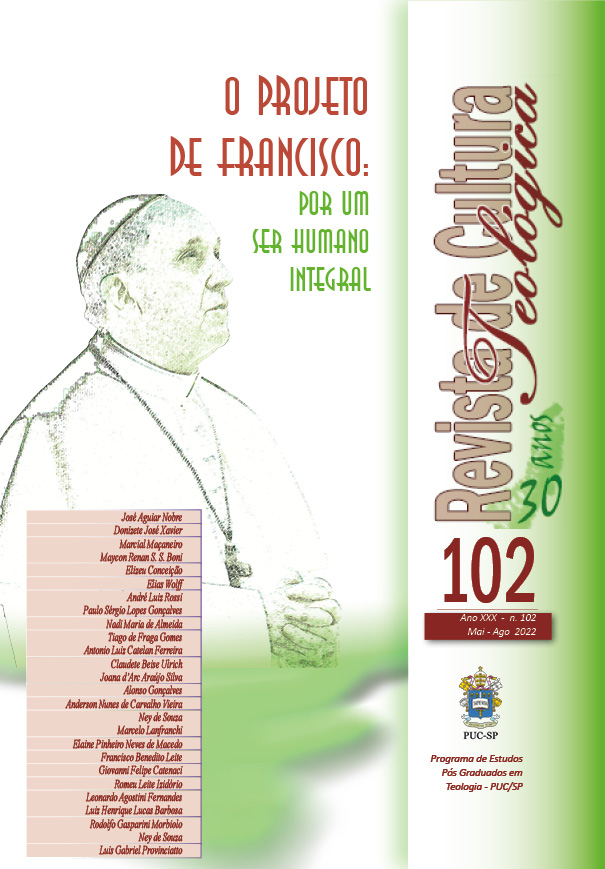«Brothers» in the Hebrew and Septuagint Bibles
A polissemic study?
DOI:
https://doi.org/10.23925/rct.i102.57900Keywords:
brother/sister, Hebrew Bible, Greek Bible, polissemy, linguistic spectrumAbstract
The Hebrew bible shows up a very large polissemy when treat of words that receive greater proeminence. This is the case of the vocable «brother», which appears in the first place in its sense of «son of the same father and/or mother», can also contain the realities of those who «are close relatives, companios, friends, of the same race or nation and even as a sign of respect and cordiality due to those to whom respect is due». As for the word «sister», althourh it has a narrower spectrum, it also goes beyond the strict connotation. The Greek Bible, called the LXX, shows the diversity of understanding when trying to elucidate some texts where «brother» could be misunderstood. In any case, «brother» has to do with «fraternity, brotherhood», whether throug blood ties or not. What can be clearly seen it that, in none of the texts studied, the vocable «brother», in the Hebrew Bible, has a meaning that is not clear, that is, it was not used for lack of a more appropriate one, but because its linguistic spectrum includes those meanings.
References
Accordance Bible Software, Version 13.3.2.
Bíblia de Jerusalém. Nova ed. rev. e ampl. 2. impr. São Paulo: Paulus, 2003.
Caravias, José Luis. Vivir como Hermanos. Reflexiones bíblicas sobre la hermandad, Madrid: PPC, 2015.
Cipollini, Pedro Carlos. Educar para a Fraternidade. Disponível em: <https://www.diocesesa.org.br/2022/03/17/educar-para-a-fraternidade>, acesso em 25 mar. 2022.
Fishbane, Michael. The Treaty Background of Amos 1:11 and Related Matters. In: Journal of Biblical Literature, vol. 89, nº 3, pp. 313-318, sep. 1970. Disponível em: <http://www.jstor.org/stable/3263501>. Acesso em 23 nov. 2015.
Hamilton, Victor P. אָח. In: VanGemeren, Willem A. (Org.). Novo Dicionário Internacional de Teologia e Exegese do Antigo Testamento. São Paulo: Cultura Cristã, 2011. v. 1.
Hamilton, Victor P. אָחוֹת. In: VanGemeren, Willem A. (Org.). Novo Dicionário Internacional de Teologia e Exegese do Antigo Testamento. São Paulo: Cultura Cristã, 2011. v. 1.
Jenni, Ernst. אָח. In: Jenni, Ernst; Westermann, Claus (Eds.). Diccionario Teologico Manual del Antiguo Testamento. Madrid: Ediciones Cristiandad, 1978. v. I.
McKenzie, John L. Dicionário Bíblico. São Paulo: Paulus, 19846.
Ringgren, Helmer. אָח. In: Botterweck, G. Johannes; Ringgren, Helmer (Orgs.). Grande Lessico dell’Antico Testamento. Brescia: Paideia, 1988. v. I.
Swedenborg, Emanuel. (1688-1872), Arcana Cœlestia. The heavenly arcana contained in the Holy Scripture or Word of the Lord unfolded, beginning with the book of Genesis (Numbers 2145-2893), Pennsylvania: Swedenborg Foundation, 2009. v. 3.
Vine, W. E. Diccionario Expositivo de palabras del Antiguo y Nuevo Testamento exhaustivo de VINE. Nashville: Grupo Nelson, 2007.
Wolf, Herbert. אחה. In: Harris, R. Laird; Archer Jr., Gleason L.; Waltke, Bruce K. (Eds.). Dicionário Internacional de Teologia do Antigo Testamento. São Paulo: Vida Nova, 1998.
Published
How to Cite
Issue
Section
License
Copyright (c) 2022 Revista de Cultura Teológica

This work is licensed under a Creative Commons Attribution-NonCommercial-NoDerivatives 4.0 International License.
Os autores concedem à revista todos os direitos autorais referentes aos trabalhos publicados. Os conceitos emitidos em artigos assinados são de absoluta e exclusiva responsabilidade de seus autores.

